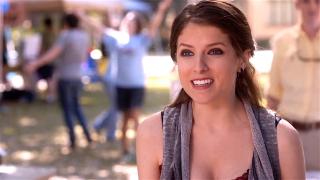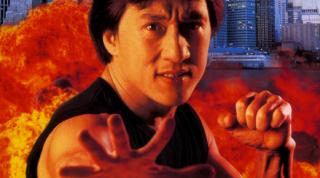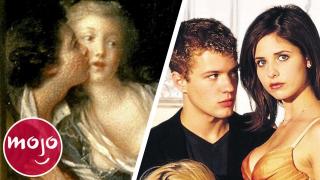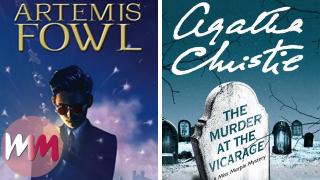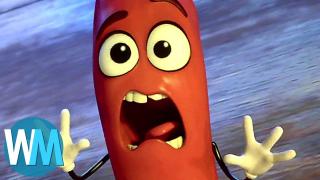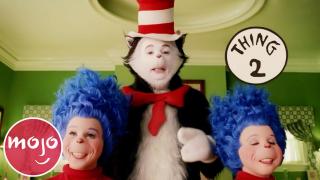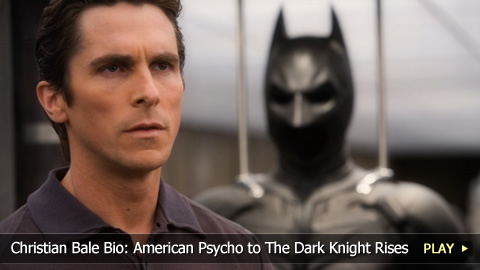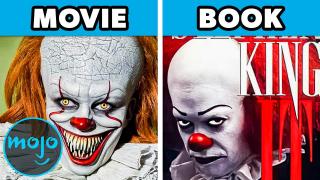Top 10 Movies Better Than The Books They Were Based On
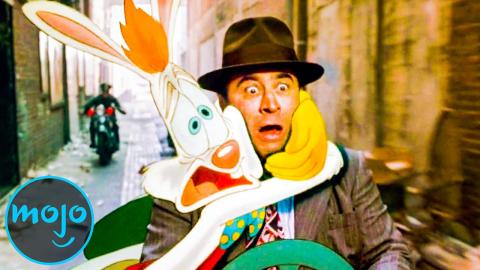
Disagree with our rank? Check out the voting page for this topic and have your say! WatchMojo.comsuggest/Top+Ten+Movies+Better+Than+the+Books+They+Were+Based+On
Special thanks to our user Mark35950 for suggesting this idea!
Top 10 Movies Better Than The Books They Were Based On
The book is always better than the movie… well okay, not always. Welcome to WatchMojo.com and today we’ll be counting down our picks for the Top 10 Movies Better Than the Books They Were Based On. For this list, we’re looking at films that – in some way or another – eclipse their source material. In most cases, the novels are still great, but the story benefited from a more visual interpretation.
#10: “The Graduate” (1967)
Top 10 Movies Most People Dont Know Were Based on Books
Charles Webb's first novel survived its transition to the big screen mostly intact, but Mike Nichols' direction and the charming cast certainly elevated the story. Populated with directionless characters who rarely have anything of substance to say, "The Graduate" is a melancholy drama packed with sexual frustration. The titular “graduate” is far more likable in the film, however, while Nichols injects just enough humor to lighten some of the tension. Also, Webb's book doesn’t come with a Simon & Garfunkel soundtrack, so it’s automatically less memorable.
#9: “Jackie Brown” (1997)
Top 10 Jackie Chan Movies
Quentin Tarantino knows a thing or two about crime dramas, so Elmore Leonard’s novel “Rum Punch” was a prime choice for an adaptation. "Jackie Brown" closely follows the original's story; however, while the book is more of an ensemble piece, the film places the focus squarely on Pam Grier's eponymous stewardess character. Even though "Rum Punch" delves deeper into the minds of the secondary characters, Tarantino's tribute to the 1970s blaxploitation genre just oozes charm. Bolstered by a thrilling soundtrack, Grier's immaculate performance is complemented by fantastic turns from Samuel L. Jackson, Robert Forster, Robert De Niro, and Michael Keaton.
#8: “Die Hard” (1988)
Top 10 Movies You Didn’t Realize Were Based on Classic Literature
Yes, "Die Hard" is based on a novel – however, John McClane is a Hollywood original. Roderick Thorp's novel "Nothing Lasts Forever" and the Bruce Willis classic both center around detectives caught in a building with terrorists, but the novel's protagonist is a retired officer who specializes in catching explosive baddies. "Die Hard" presents McClane as an everyman who’s in way over his head, which is more exciting than "Nothing Lasts Forever's" action hero protagonist. Adding a touch of holiday spirit and a bunch of perpetually quotable lines, "Die Hard" turned Thorp's nihilistic novel into the perfect action flick.
#7: “Forrest Gump” (1994)
Winston Groom's book is pretty good, but suffers due to a distinctly Tom Hanks-shaped hole. Robert Zemeckis' film adaptation of "Forrest Gump" tells the life story of an endearing man with a low IQ who inadvertently gets involved in some of history's biggest moments. Meanwhile, book Forrest is a sexually active giant that possesses overwhelming strength and loves to swear, lacking Hanks' relatability or likability. Nowhere near as magical as Zemeckis' adaptation, Groom's book manages to be simultaneously darker and sillier; at one point, Forrest and his ape partner Sue crash-land a space shuttle on an island of cannibals.
#6: “The Shawshank Redemption” (1994)
Top 10 Books Being Made into Disney Movies
Stephen King's mind is a frequent source of inspiration for filmmakers, but few adaptations come close to matching the written word’s brilliance. Released in 1994, "The Shawshank Redemption" is based on a novella and, arguably, presides among the greatest films of all time. Both versions center on Andy Dufresne's time in the Shawshank State Penitentiary, but the film streamlines the story by combining several characters together. While King's novella is well worth a read, "The Shawshank Redemption”’s best moments – primarily Brooks' time on the outside and the powerful ending – are only in the film.
#5: “Who Framed Roger Rabbit” (1988)
Top 10 Controversial Moments In Animated Movies
Certain stories are just made for the big screen. Gary K. Wolf's "Who Censored Roger Rabbit?" is a hard-boiled noir novel that envisions a world where toons and humans co-exist. Seven years later, "Who Framed Roger Rabbit" enchanted audiences with stunning animation, a touching storyline, and ALL of the cameos. Aside from the basic premise and some character names, the film diverts heavily from the book and opts for a more family-friendly experience. With a premise based on the visual medium of cartoons, film tops paper here without question.
#4: “Dr. Strangelove Or: How I Learned To Stop Worrying And Love The Bomb” (1964)
Top 20 Books That Should've NEVER Been Made Into Movies
This adaptation was so good that the novel’s author decided to write his own adaptation of the film! Peter George's book "Red Alert" is a serious Cold War thriller that deals with the pending threat of a nuclear war. On the other hand, Stanley Kubrick's "Dr. Strangelove" is a hilarious satire film presented as a serious Cold War thriller that deals with the pending threat of a nuclear war. Peter Sellers' titular Doctor is film-only, and Kubrick's absurdist wit only further enhances the ridiculousness of the situation. Rather than publish a reprint of "Red Alert," George novelized an early draft of the film's script which, regrettably, involved aliens.
#3: “Jaws” (1975)
Peter Benchley's 1974 best-selling novel about a great white shark was swallowed whole by Steven Spielberg's classic summer blockbuster. In the book version, “Jaws”’ antagonist is more of a means to an end, with Benchley regularly halting the story to comment on the recession or an uninteresting love affair. Trimming most of the fat and – due to production problems – rarely showcasing the shark; Spielberg's adaptation delivers a thrilling and suspenseful blockbuster that's aged far better than the novel. As the icing on the cake, the "Indianapolis" monologue is film-only.
#2: “Psycho” (1960)
Christian Bale Bio: From American Psycho to The Dark Knight Rises
Similar... but completely different. On paper, Alfred Hitchcock's "Psycho" hits all of the major plot points in Robert Bloch's novel of the same name; however, the film one-ups the book by employing narrative tricks that enhance the story's sense of mystery. The novel never pretends that Mary Crane – or, as she’s known in the film, Marion Crane – is the protagonist, while the twist ending is slightly more predictable due to Norman Bates being presented as an overtly misogynistic alcoholic rather than a mama's boy. Bloch's novel presents an interesting look into Bates' broken mind, but Hitchcock's film adaptation is a cinematic masterpiece. Before we unveil our top pick, here are a few honorable mentions. “The Silence Of The Lambs” (1991) “A Clockwork Orange” (1971) “Jurassic Park” (1993)
#1: “The Godfather” (1972)
Top 10 Horror Movie Questions That Are Answered in The Books
Mario Puzo's expertly-written novel delves deep into the lives and history of a New York crime family and sits among the better pulp novels of the era. While a great read, “The Godfather”’s definitive version has to be Francis Ford Coppola's film, which is rightfully considered a work of art that practically transcends cinema. Leaving Puzo's flashbacks for the sequel and cutting any subplots that do not directly concern the Corleones, Coppola's adaptation boasts flawless cinematography; authentic set design; an iconic score by Nino Rota; and a stellar cast.


